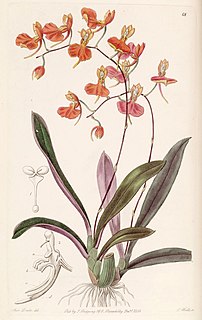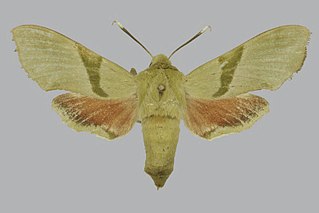
Banksia coccinea, commonly known as the scarlet banksia, waratah banksia or Albany banksia, is an erect shrub or small tree in the family Proteaceae. Its distribution in the wild is along the south west coast of Western Australia, from Denmark to the Stokes National Park, and north to the Stirling Range, growing on white or grey sand in shrubland, heath or open woodland. Reaching up to 8 m (26 ft) in height, it is a single-stemmed plant that has oblong leaves, which are 3–9 cm (1.2–3.5 in) long and 2–7 cm (0.8–2.8 in) wide. The prominent red and white flower spikes appear mainly in the spring. As they age they develop small follicles that store seeds until opened by fire. Though widely occurring, it is highly sensitive to dieback and large populations of plants have succumbed to the disease.

Miltochrista is a genus of moths of the family Erebidae, subfamily Arctiinae. The genus was erected by Jacob Hübner in 1819.
Propyria is a genus of moths in the subfamily Arctiinae. The genus was erected by George Hampson in 1898.

Ptychoglene is a genus of moths in the subfamily Arctiinae. The genus was erected by Felder in 1874.

Comparettia coccinea is a species of orchid. It is native to Venezuela, Peru, Brazil and Bolivia.
Polychrysia morigera, the disjunct looper, is a moth of the family Noctuidae. The species was first described by Henry Edwards in 1886. In the east of North America, it is found in the Mississippi, Missouri, and Ohio river valleys from Pennsylvania to Tennessee. In the Rocky Mountains it is found from Montana to Colorado and on the west coast it occurs from Oregon to northern California. It is the rarest of the North American Plusiinae species.

Proserpinus terlooi, the Terloo sphinx moth, is a moth of the family Sphingidae first described by Henry Edwards in 1875. It is found from southern Arizona to Sonora in Mexico.
Miltochrista coccinea is a moth of the family Erebidae. It was described by Frederic Moore in 1886. It is found in Assam, India.
Propyria ptychoglene is a moth in the subfamily Arctiinae. It was described by George Hampson in 1898. It is found in Mexico and Guatemala.
Ptychoglene pertunda is a moth in the subfamily Arctiinae. It was described by Herbert Druce in 1889. It is found in Mexico.
Ptychoglene xylophila is a moth in the subfamily Arctiinae. It was described by Herbert Druce in 1885. It is found in Mexico, Guatemala and Nicaragua.
Ptychoglene sanguineola is a moth in the subfamily Arctiinae. It was described by Jean Baptiste Boisduval in 1870. It is found in Arizona, Mexico and Guatemala.
Ptychoglene aequalis is a moth in the subfamily Arctiinae. It was described by Francis Walker in 1854. It is found in Guatemala.
Ptychoglene phrada is a moth in the subfamily Arctiinae. It was described by Herbert Druce in 1889. It is found in Arizona and Mexico.
Ptychoglene erythrophora is a moth in the subfamily Arctiinae. It was described by Felder in 1874. It is found in Mexico.
Ptychoglene rubromarginata is a moth in the subfamily Arctiinae. It was described by Herbert Druce in 1885. It is found in Costa Rica.

The Cisthenina are a subtribe of lichen moths in the family Erebidae, currently containing 428 described species.

Garrha is a genus of moths of the family Oecophoridae.
Grevillea coccinea, commonly known as the scarlet grevillea, is a shrub of the genus Grevillea native to an area along the south coast of the Great Southern and Goldfields-Esperance regions of Western Australia.







